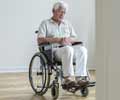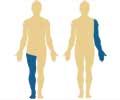Rutgers University engineers have modified a home video game, which has shown promise in improving hand function in teenagers with cerebral palsy.
Rutgers University engineers have modified a home video game, which has shown promise in improving hand function in teenagers with cerebral palsy.
In a pilot trial with three participants, the system enhanced the teens' abilities to perform a range of daily personal and household activities.The modified system combined a Sony PlayStation 3 console and a commercial gaming glove with custom-developed software and games to provide exercise routines aimed at improving hand speed and range of finger motion.
The Rutgers engineers, who are members of the university's Tele-Rehabilitation Institute, collaborated with clinicians at the Indiana University School of Medicine to deploy systems in participants' homes for up to 10 months.
Grigore Burdea, professor of electrical and computer engineering and director of the Rutgers Tele-Rehabilitation Institute, said:
"Based on early experience, the system engages the interest of teens with cerebral palsy and makes it convenient for them to perform the exercises they need to achieve results."
Each system communicated via the Internet to allow the Indiana and Rutgers researchers to oversee participants' exercise routines and evaluate the effectiveness of the systems. The system is an example of virtual rehabilitation, where patients interact with computer-generated visual environments to perform exercises, and tele-rehabilitation, where patients perform exercises under remote supervision by physical or occupational therapists.
Advertisement
"The virtual reality telerehabiltiaiton system kept them exercising by rewarding whatever movements they could make, and all three showed significant progress in hand function."
Advertisement
After three months of therapy, two participants progressed from being unable to lift large, heavy objects to being able to do so. Participants showed varying improvement in such activities as brushing teeth, shampooing, dressing, and using a spoon. At 10 months, one participant was able to open a heavy door.
Burdea said: "Systems like this have the potential for widespread deployment in outpatient clinics or the homes of people needing rehabilitation services for any number of illnesses or injuries.
"Well-designed custom games are likely to hold patients' attention and motivate them to complete their exercises, versus conventional therapy regimens, which patients may find boring or tedious."
A description of the modified system and its use in the pilot trial has been published in the journal, IEEE Transactions on Information Technology in Biomedicine.
Source-ANI
RAS












